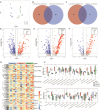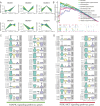Proteomic Analysis of Tissue Proteins Related to Lateral Lymph Node Metastasis in Papillary Thyroid Microcarcinoma
- PMID: 39600146
- PMCID: PMC11705366
- DOI: 10.1021/acs.jproteome.4c00737
Proteomic Analysis of Tissue Proteins Related to Lateral Lymph Node Metastasis in Papillary Thyroid Microcarcinoma
Abstract
Patients with lateral lymph node metastasis (LLNM) may experience higher locoregional recurrence rates and poorer prognoses compared to those without LLNM, highlighting the need for effective preoperative stratification to reliably assess risk LLNM. In this study, we collected PTMC samples from Peking Union Medical College Hospital and employed data-independent acquisition mass spectrometry proteomics technique to identify protein profiles in PTMC tissues with and without LLNM. Pseudo temporal analysis and single sample gene set enrichment analysis were conducted in combination with The Cancer Genome Atlas Thyroid Carcinoma for functional coordination analysis and the construction of a prediction model based on random forest. Non-negative matrix factorization (NMF) clustering was utilized to classify molecular subtypes of PTMC. Our findings revealed that the differential activation of pathways such as MAPK and PI3K was critical in enhancing the lateral lymph node metastatic potential of PTMC. We successfully screened biomarkers via machine learning and public databases, creating an effective prediction model for metastasis. Additionally, we explored the mechanism of metastasis-associated PTMC subtypes via NMF clustering. These insights into LLNM mechanisms in PTMC may contribute to future biomarker screening and the identification of therapeutic targets.
Keywords: biomarker; lateral lymph node metastasis; mass spectrometry; papillary thyroid microcarcinoma; proteomics.
Conflict of interest statement
The authors declare no competing financial interest.
Figures





References
Publication types
MeSH terms
Substances
Supplementary concepts
LinkOut - more resources
Full Text Sources
Medical

